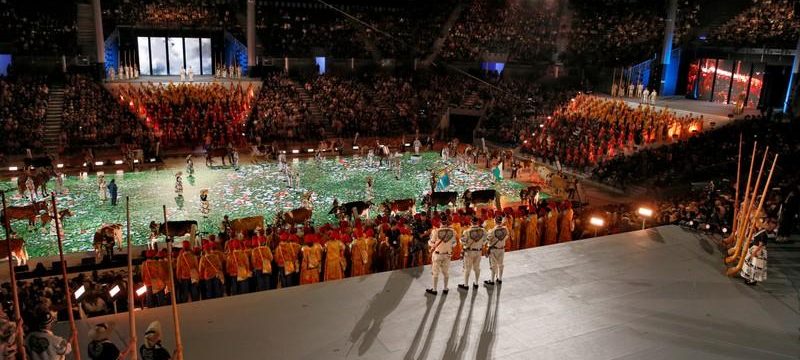VEVEY, Switzerland (Reuters) – Switzerland uncorked a once-in-a-generation celebration of its winemakers on Thursday, with fancy dress, alpine horns, cows and dancers kicking off a festival that dates back to the 18th century.
The three-week “Fete des Vignerons” began in 1797, but its roots go back a century further when winemakers used to shame the country’s worst vineyard worker each year by crowning them in front of the church at Vevey, in the heart of the wine-producing canton of Vaud.
The practice went on for years until one day the Fraternity of Winemakers decided to do the opposite: to thank and honor the best.
The festival is now held roughly every 20 years and on Thursday 5,500 locals donned costumes, wigs and makeup to take part in the elaborate gala opening, a firm reminder that Switzerland is not only about cheese or luxury watches.
Swiss wines are little known abroad, because so little is exported, and even at home there is not always enough to meet demand, said the festival’s executive director, Frederic Hohl.
“Because of the exceptional scarcity of the wine produced in this region, even if you are friends with a winemaker, you might sometimes manage to buy just six bottles – because he likes you,” Hohl said.
“How lucky we are in this region to be able to enjoy this wine. And really, this show highlights the work on the vineyard, on the land. And you can feel it when you taste the wine and when you watch the show, you can feel this relation to the land.”
The Swiss are some of the world’s top wine drinkers, consuming an average of 33 liters each in 2017, or 1.15% of global consumption, according to the International Organisation of Vine and Wine.
Not all Swiss wine is the same, with a range of climates and grape varieties, said Vincent Chollet, standing among his sunny vines sloping down towards Lake Geneva. Grape varieties include pinot noir, chasselas, gamay, merlot and many more.
“If you talk with a winemaker from Vaud canton, they will have a different philosophy from a winemaker from Ticino or Graubunden or Neuchâtel.”
Source: Read Full Article
